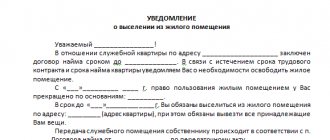The eviction of citizens from residential premises requires the implementation of a certain number of legal procedures, for example, such as contacting the police, preparing and filing claims in court, and others. The owner of a residential premises has the right to initiate such a procedure on the basis of his right to own, use and dispose of living space at his own discretion. However, the powers of the owner are not unlimited; they may be limited by the right to use the residential premises by other citizens. The grounds for eviction of citizens are regulated by Art. 84-85 and 90-91 of the Housing Code of the Russian Federation, while civil law regulates the procedure for acquiring and terminating ownership of apartments and houses. The procedure for eviction, as well as confiscation of property, is regulated by the Federal Law on Enforcement Proceedings.
Important! Eviction of citizens is possible both with the provision of comfortable housing and without alternative housing provision.
Grounds for eviction of citizens
Any eviction involves termination of the right to use the residential premises of a certain citizen or several citizens. Such actions entail a ban on these citizens from:
- penetration into a residential premises;
- permanent presence in this living space for the purpose of residence.
In addition, during eviction, demands may be submitted to the court to remove a citizen from permanent or temporary registration, while a citizen can be evicted only after he has lost the right to use the residential premises. A citizen may be evicted with the provision of another housing if:
- the apartment building is recognized as unsafe and unsuitable for habitation;
- the living space is transferred to a religious organization;
- the dwelling is subject to transfer to non-residential premises;
- the land plot on which the residential property is located is subject to seizure for state or municipal needs;
- when citizens do not pay for utility services for 6 months without a good reason.
Without providing other housing, citizens are evicted:
- in case of systematic violation of the rights of neighbors - unsanitary conditions, excessively active behavior at night, etc.;
- if the tenant and/or members of his family living with him use the residential premises for other purposes;
- if the parents are deprived of parental rights and their cohabitation with the child is impossible due to a threat to the health and life of the minor.
In addition, the current law provides grounds for eviction of citizens in case of illegal redevelopment of residential premises. In this situation, the municipality issues an order to eliminate the offense and sets a specific deadline for its execution. If a citizen does not want to restore the housing to its previous condition voluntarily, local authorities go to court for the forced seizure of the residential premises and sell them at public auction. The proceeds are transferred to the former owner minus the amount spent on organizing the auction.
Causes
In addition to the above reasons, there are many other reasons for eviction of tenants:
- failure to comply with the terms of the contract;
- violation of the rules for using/residing in an apartment/house in accordance with Article 103 of the Housing Code of the Russian Federation, Article 83 of the Housing Code of the Russian Federation.
The provisions of the tenancy agreement are fundamental for residents, so it is necessary to carefully study the document itself so that there are no misunderstandings or disagreements.
As a rule, the agreement is concluded for a certain period, but if it is not specified, the owner can terminate it at any time, usually by notifying 3 months in advance .
Often, a family living in a property buys a new one after some time and voluntarily terminates the agreement, but there are many cases when the initiative quite naturally comes from the owner himself.
As a rule, the main reasons for such a decision are listed in Art. 83 Housing Code of the Russian Federation:
- Violation of peace, legal rights and interests of neighbors in accordance with Art. 83 Housing Code of the Russian Federation, when music plays at night, rowdy behavior, hooliganism, and loud noise occur. This naturally interferes with normal rest and sleep near the people living there.
- Deliberate damage to property or apartments, either by the residents themselves or by other persons for whom the residents are responsible, which makes the premises unsuitable for further residence or requires significant costs for major repairs.
- Failure to pay utility bills for more than 6 months, which prompts the owner to evict the tenants, but the tenant can prove that payment was not made for valid reasons (illness, late wages at work, etc.).
- Use of the premises not for residence, but for other purposes (business activities, parties, holidays, etc.).
Eviction is also possible in situations where the tenant or one of his family members deliberately damages the property of neighbors, commits vandalism, hooliganism, etc.
The legislation contains all possible reasons for eviction, but there is another important point: if a person has violated the terms of the agreement, then the owner has the right to evict him, and if the agreement provides for its early termination, then in the event of failure to fulfill certain conditions or simply on the initiative of the owner, the tenants are evicted.
Naturally, the reasons may also be purely individual, which cannot be provided for by law.
How does eviction from certain categories of residential premises occur?
Such a procedure necessarily requires a trial and an appropriate court decision. Direct enforcement proceedings are initiated on the basis of a writ of execution received after a court decision.
- Eviction from the apartment
It is imperative to take into account the legal status of the owner of the residential premises. Thus, citizens have the right to evict persons illegally residing there from an apartment, but difficulty arises when we are talking about eviction of tenants who paid for their accommodation but did not enter into a rental agreement for residential premises. The fact is that many owners are afraid to contact law enforcement agencies due to the fact that they may be held responsible for illegal business. With an existing commercial lease agreement, the situation is simplified; the co-owner can initiate the eviction of tenants on the basis of Article 687 of the Civil Code of the Russian Federation. In particular, the owner has the right to demand the eviction of the tenant in court if the latter does not pay rent for the apartment within 6 months for a long-term rental or 2 times in a row for a short-term rental. You can also evict tenants from an apartment if it is established that they have damaged the living space.
Important! During the consideration of the case, the court may decide to postpone the eviction of citizens for up to 1 year and give them the opportunity to “rehabilitate”.
- Eviction from residential premises.
According to the law, residential premises are premises suitable for permanent residence of citizens - this is an apartment, a room in a dormitory, a room in a communal apartment, a private house, rooms in a social housing stock.
Important! Citizens who have not reached the age of majority have the right to use privatized and municipal housing even after the divorce of their parents.
- Eviction from the hostel.
As you know, accommodation in municipal hostels is carried out on the basis of a social tenancy agreement. At the same time, the owners of privatized rooms are more insured against eviction, since they have the right to dispose of their property at their own discretion. In general, citizens can be evicted from a hostel due to non-compliance with a social tenancy agreement:
- when the residential premises are used for other purposes;
- when the fact of deliberate damage to living space has been established.
Important! When a dormitory is demolished, homeowners are entitled to other comfortable housing, which is allocated based on their minimum standard of living space per person established by local governments.
- Eviction from a land plot.
When citizens are evicted from a land plot, in particular when it is withdrawn for municipal or state needs, the owner is provided with compensation equivalent to the lost housing or another comfortable house. In this case, an agreement on the provision of other housing with the owner must be reached before eviction.
Important! The municipality has the right to initiate the procedure for eviction of citizens from a private house, which is located on a plot of land being confiscated, no later than 1 year from the date of the decision to confiscate this plot.
Who cannot be evicted from a service apartment?
There is a whole category of citizens who cannot be evicted from official housing without the provision of another apartment (Article 103 of the Housing Code of the Russian Federation). The ban applies only if the family has no other housing with the right of use or ownership.
This special category includes:
- disabled military personnel;
- WWII veterans;
- combat veterans;
- elderly pensioners;
- orphans, including those whose parents died in service;
- families of military personnel killed or missing in the line of duty, representatives of the FSB, law enforcement, customs authorities, firefighters;
- employees who have worked for more than ten years.
All persons living in specialized housing must be registered as in need of improved housing conditions . They cannot evict tenants who moved in before the Housing Code of the Russian Federation came into force (2005), or those living under a social tenancy agreement or who have the right to be registered as such (Article 52 of the Housing Code of the Russian Federation). If an employee has worked for 10 years, and the apartment is on the balance of the local government, it is also impossible to evict his family after dismissal.
Resolution of the Supreme Court of the Russian Federation No. 14 notes that when evicting, all courts must take into account the interests of vulnerable sections of society, which include children, pensioners, disabled people, low-income citizens, including large families.
Notice of eviction
This document contains a requirement to vacate the premises within a certain period of time on a voluntary basis. The eviction notice must include:
- information about the debtor;
- the court's decision;
- full name of the executive document;
- data on the living space where the citizen should be evicted.
Important! The notification may precede the statement of claim if the plaintiff wishes to resolve the conflict out of court.
Arbitrage practice
The final decision of the court contains conclusions based on the evidence provided.
Provisions of the operative part:
- address, location of specialized residential premises;
- type of housing - dormitory, apartment, room;
- what is the basis for eviction;
- address of the new residential premises - if the tenant is evicted from a dilapidated building.
Practice shows that the overwhelming number of disputes are resolved in favor of the owners . Especially if the employer and his family members violated the rules of living in a government-owned residential property.
But there are also opposite cases when the courts meet the tenants halfway, preserving their right to live in the apartment. For example, if residents have nowhere to go, and specialized housing is the only place they can be. Typically, such residents are included in the low-income category. Subsequently, they apply to conclude a social rental agreement for an apartment.
VIDEO:
Attention!
- Due to frequent changes in legislation, information sometimes becomes outdated faster than we can update it on the website.
- All cases are very individual and depend on many factors. Basic information does not guarantee a solution to your specific problems.
That's why FREE expert consultants work for you around the clock!
- via the form (below), or via online chat
- Call the hotline:
- Moscow and the Region
- St. Petersburg and region
- FREE for a lawyer!
By submitting data you agree to the Consent to PD Processing, PD Processing Policy and User Agreement.
Anonymously
Information about you will not be disclosed
Fast
Fill out the form and a lawyer will contact you within 5 minutes
Tell your friends
Rate ( 2 ratings, average: 5.00 out of 5)
Author of the article
Maxim Privalov
Lawyer. 2 years of experience. I specialize in civil disputes in the field of housing and family law.
Author's rating
Articles written
610
Statement of claim to court
A statement of claim for eviction, a sample of which you can find on our website, is filed in accordance with Articles 131 and 132 of the Code of Civil Procedure of the Russian Federation. The claim must contain information about the parties to the proceeding, the substance of the dispute and the requirements of the parties. The document can indicate specific witnesses who will need to be questioned during the trial. The court must make a decision to accept the statement of claim for proceedings within 5 days from the date the document is received by the office. All documents held by the parties must be attached to the statement of claim; their list includes:
- certificate of ownership and other title documents;
- application to law enforcement agencies and housing inspection;
- receipt for payment of state duty.
In addition, the parties have the right to submit written evidence when considering the case on the merits and to file motions to obtain evidence through the court.
What is service housing
Special funds or simply official housing are considered to be premises that are given to employees of government departments and organizations for serving within the framework of labor relations. Housing facilities can be represented by dormitories, municipal apartments, private rooms, etc.
The features of the specialized housing stock (Article 92 of the Housing Code of the Russian Federation) are as follows:
- are owned by federal and municipal authorities;
- service apartments are not included in the category of privatized housing in the Russian Federation;
- temporary transfer of official housing is carried out within the framework of a rental agreement for such premises;
- objects of the special fund are not alienated.
Separate rooms in municipal apartments cannot be considered official housing. True, there are cases when an apartment building has several service apartments. The owner is a government agency or municipality.
Judgment in eviction cases
As stated earlier, a court decision in eviction cases must be carefully reasoned and based solely on the evidence that was provided by the parties during the trial. The court decision must contain:
- introductory part - information about the parties to the court session is indicated;
- descriptive part – directly reveals the essence of the dispute;
- motivational part – contains the facts that the court was able to establish;
- operative part – indicates the court decision to evict citizens or to refuse to satisfy the plaintiff’s demands.
Options for deprivation of housing
There are only two options for deprivation of housing:
- Provided otherwise.
- No provision.
In the first case, all responsibility falls on the owner institution, in the second - on the employer.
The decision depends on the circumstances of the case and how realistic it is for the citizen to find another place of residence and pay for it.
In what cases, according to the law, is it possible to evict a person without providing him with another living space, we described in this material.
Deadlines for making a decision
The Civil Procedure Code of the Russian Federation does not indicate specific deadlines for making a court decision in cases of eviction of citizens from residential premises, however, it contains the rule that cases must be considered within a reasonable time. If the time for consideration of the case is delayed, the parties have the right to apply to the chairman of the court with an application to accelerate the time for consideration of the case. At the same time, replacing a judge when considering a case on the merits cannot be a basis for extending the trial period.
Important! The statement of claim is considered no later than 5 days from the date of receipt by the court. In his ruling, the judge indicates what actions must be taken to speed up legal proceedings.
Where will the employee live?
The owner is not required to place the evicted employee in new housing , especially in cases where the tenant has another apartment or has somewhere to stay for the first time.
This issue also has its own reservations regarding those people who have been on the waiting list for housing for many years and began living on office square meters until 2005, when the new Housing Code of the Russian Federation was issued.
Such categories of citizens are required to be given other living space on alternative terms. This means that a social rental agreement will be concluded , and they have no right to ask them to pack their things and go somewhere.
Part one of article one hundred and three of the Housing Code of the Russian Federation states that there are some citizens who cannot be asked to move out of their living space.






